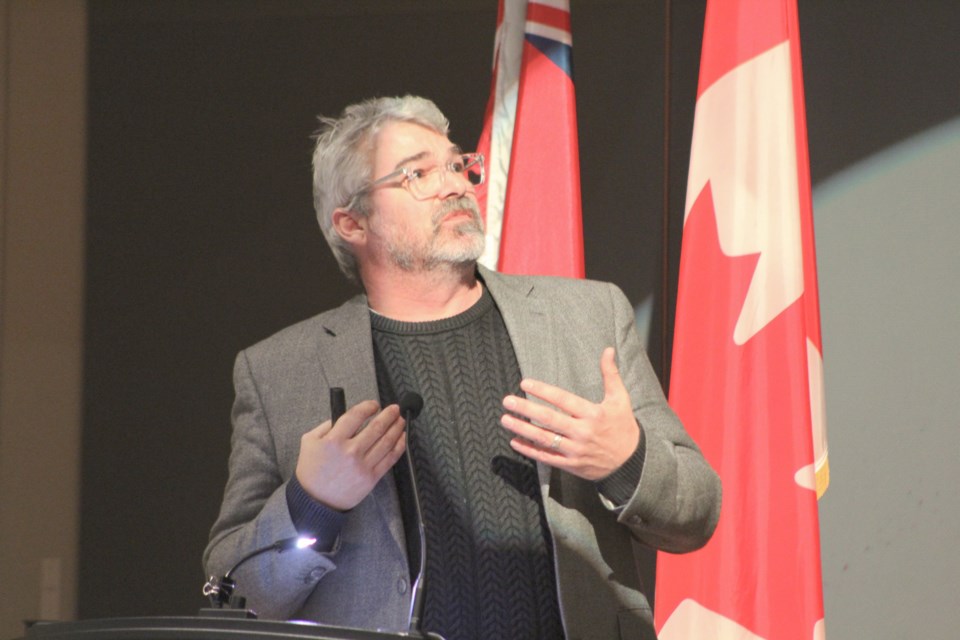When Glen Canning was getting ready for his first date with Krista, the woman who would become his wife, he was worrying about how he looked, whether she would like him.
Krista, meanwhile, was taking the precautionary step of letting her friends know where she would be and when she would be there.
For Canning, it helped put into perspective the reality faced by women. That reality became much more painfully clear when his daughter, Rehtaeh Parsons, tried to take her own life in 2013 at the age of 17. After hanging herself in her home in Nova Scotia, she was taken to hospital and, three days later, taken off life support.
The tragedy came after a photo of what she claimed was a sexual assault was circulated widely, and Parsons was relentlessly bullied as a result. Even friends she had known since she was six years old got in on the bullying.
Canning was the guest speaker Thursday during a ceremony at Ontario Provincial Police headquarters in Orillia to mark the National Day of Remembrance and Action on Violence Against Women. Canning’s message: It’s time to end the “silent support” for violence against women.
With a tone of regret in his voice, he acknowledged the problem didn’t hit home for him until he lost his daughter,.
“I hate that about myself — that that is what it took (to become an advocate),” he said.
“Where was I before my daughter died?”
In the immediate aftermath of Parsons’s death on April 7, 2013, Canning’s focus seemed to be on his own grief.
“I just locked myself in my house and I wanted to die,” he said.
Then, he saw Parsons’s mother, Leah, being interviewed on TV.
“She was broken,” he recalled, “and it just came to me: Why is she standing there without me?”
He has since made it his mission to advocate for female victims of violence. He has spoken at conferences and high schools to share his daughter’s story and encourage people — men, especially — to speak up. It’s men, Canning said, who are most needed to fight for an end to the “toxic masculinity” that leaves so many women and girls in fear and danger.
Canning often finds his audiences are made up mostly of women, but it was a group of male high-school students in Ottawa who were waiting to speak with Canning after his presentation there. They wanted to do something to address the problem. So, led by Noah Abraham, they started a group called ManUp. Not only do they discourage violence against women; they intervene when they see abuse or harassment. There are now 28 ManUp groups in schools from Ottawa to Kingston.
“Their idea of ‘man up’ was to redefine what that means. You speak up. You stand up,” Canning said. “It made me feel so good because this, to me, is where change happens.”
Canning thanked police for the difficult work they do to prevent and address violence against women, and he signed off by asking for forgiveness.
“I stand here today, asking the women in my life to forgive me for my silence. All I can do is recommit myself (to the cause) the best way that I can.”
Before Canning’s presentation Thursday, 14 candles were lit in memory of the 14 women who were killed at Montreal’s École Polytechnique on Dec. 6, 1989. The man who did it was motivated by his contempt for women.
Chaplain Gerry McMillan read each name aloud.
“This is an important day of remembrance. I believe in naming names,” he said. “I pray 50 years from now we’ll continue to declare their names.”
Liz Westcott, executive director of Orillia’s Green Haven Shelter for Women and chair of the Simcoe County Violence Against Women Co-ordinating Committee, recalled hearing the news of the École Polytechnique shooting. She had two young daughters at the time.
“The incredible impact that it had on me has stayed with me every day since,” she said, calling Dec. 6 “one of the toughest days of the year” for her, every year.
Gender-based violence doesn’t seem to be declining. During last year’s ceremony at OPP headquarters, Westcott read aloud the names of some of the 32 women who were killed in Ontario. On Thursday, she read 45 of them.
“That suggests we have work to do,” she said.
Victims of the École Polytechnique attack
Geneviève Bergeron
Hélène Colgan
Nathalie Croteau
Barbara Daigneault
Anne-Marie Edward
Maud Haviernick
Maryse Laganière
Maryse Leclair
Anne-Marie Lemay
Sonia Pelletier
Michèle Richard
Annie St-Arneault
Annie Turcotte
Barbara Klucznik-Widajewicz
By the numbers
-
Women are at a 20 per cent higher risk of violent victimization than men when all other risk factors are taken into account
-
Young women between the ages of 15 and 24 experience the highest rates of violence
-
Indigenous women are more than three times as likely to report being a victim of spousal violence as non-Indigenous women
-
Women living in the territories are victimized at a rate eight times higher than those living in the provinces
Source: Government of Canada
